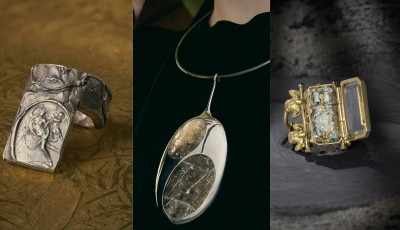THE TALK: Preparing for Recovery
At a time when everything appears to be frozen, Barbara Biffoli, the Roman designer of the homonymous jewelry brand, is focusing on research and thinking of new strategies for the future
How is your business proceeding in this so very delicate moment?
My company is a small artisan business, mainly linked to Rome and the surrounding area where 85% of my turnover takes place. In respect of the national directives, I have closed my showroom where I sell ready-to-wear goods while my website, which is specifically for e-commerce, is still up and running and we can manage the orders working from home. My future production and customer orders (both from the showroom and on-line) are all linked to activities in Italian workshops which, pursuant to the directive, are all closed and so, at the moment, I won’t be able to develop the next collections on time.
In conformity with this forced closure, what initiatives have you undertaken?
I am concentrating on research, studying materials and jewelry history. For the moment we are waiting to see how the crisis develops. Hopefully, everything will be back to normal in a few months. We have only been inactive for a few weeks and have decided not to undertake any new initiatives except to respect the national directives. For the future, I foresee, first and foremost, a search for new, highly qualified supply sources and an approach to new markets (something that was already ongoing and that we were about to develop during this period in cities such as New York and Los Angeles).
What worries you most about the future?
The same worries as everyone else. It is not a national crisis like the one we had in 1992, nor is it like that of 2008 in the USA, which had a damaging cascade effect in Europe too. It is assumed that a global crisis due to a pandemic could cause a chain reaction but I find it hard to predict the effect it will have on my work.
And, in general, how do you see things evolving?
This production cycle stoppage will cause re-organization problems in the medium/short term. Companies will immediately have to reluctantly dismiss part of their staff, thus reducing their own production. We will only be able to positively re-start working when the market becomes stable again. For the moment, the only thing to do is to keep afloat but be prepared for the recovery. When the market gives the first signs of reprisal, we will be ready. Creative artists will play a fundamental role in the recovery and will have to dig out all the resources they previously stored to meet the customers’ new and much-hoped for requests.
Systematizing could, now more than ever, be a strong point: what is your opinion on that?
Most definitely, but with competent and expert people within the sector. Systematizing can be hard work, some could see results before others and this could cause discontent but time has always shown that those who invest in it were right to do so.
Confindustria Moda Toscana has proposed a pact between companies, an anti-coronavirus supply chain. Do you think it could work for the jewelry industry too?
Every initiative is very welcome. It produces thought, studies, debates that can only be of help in finding new solutions. Although we are mainly a population of individualists, if we started to understand that sharing can be synonymous with enrichment, we could take a step forward.
A comment on Cura Italia.
No, we are waiting for our experts regarding the specific impact on our sector’s production.
How has communication changed during the pandemic?
Smartworking, social media, specific apps, video calls and direct streaming have all allowed us to keep in touch with suppliers, customers and collaborators so that we can work remotely, as well as with other designers with whom we can exchange our own impressions and experiences. This pandemic will definitely give Italy, which is still not in line with leading world countries in terms of digitalization, a greater awareness of how being connected with the world, of which we are citizens regardless of our country of origin, can be important, even in the remotest corner of our territory.






